Analyzing the Doctrine of Separation of Powers in Singapore
VerifiedAdded on 2023/04/21
|13
|3429
|172
Essay
AI Summary
This essay discusses the doctrine of separation of power in Singapore, emphasizing its constitutional provisions and the fundamental rules of natural justice within criminal law. Drawing from the theories of John Locke and Montesquieu, the paper examines how Singapore's constitution divides governing power among the executive, legislature, and judiciary to maintain checks and balances. It highlights key cases like Ong Ah Chuan v. Public Prosecutor and Yong Vui Kong v. Attorney-General, which illustrate the judiciary's role in safeguarding constitutional rights and occasionally intervening against unconstitutional laws. The essay concludes that while the judiciary strives to uphold the separation of powers, it also acts as a guardian of the Constitution, ensuring the protection of individual liberties and preventing abuse of power by other government branches.
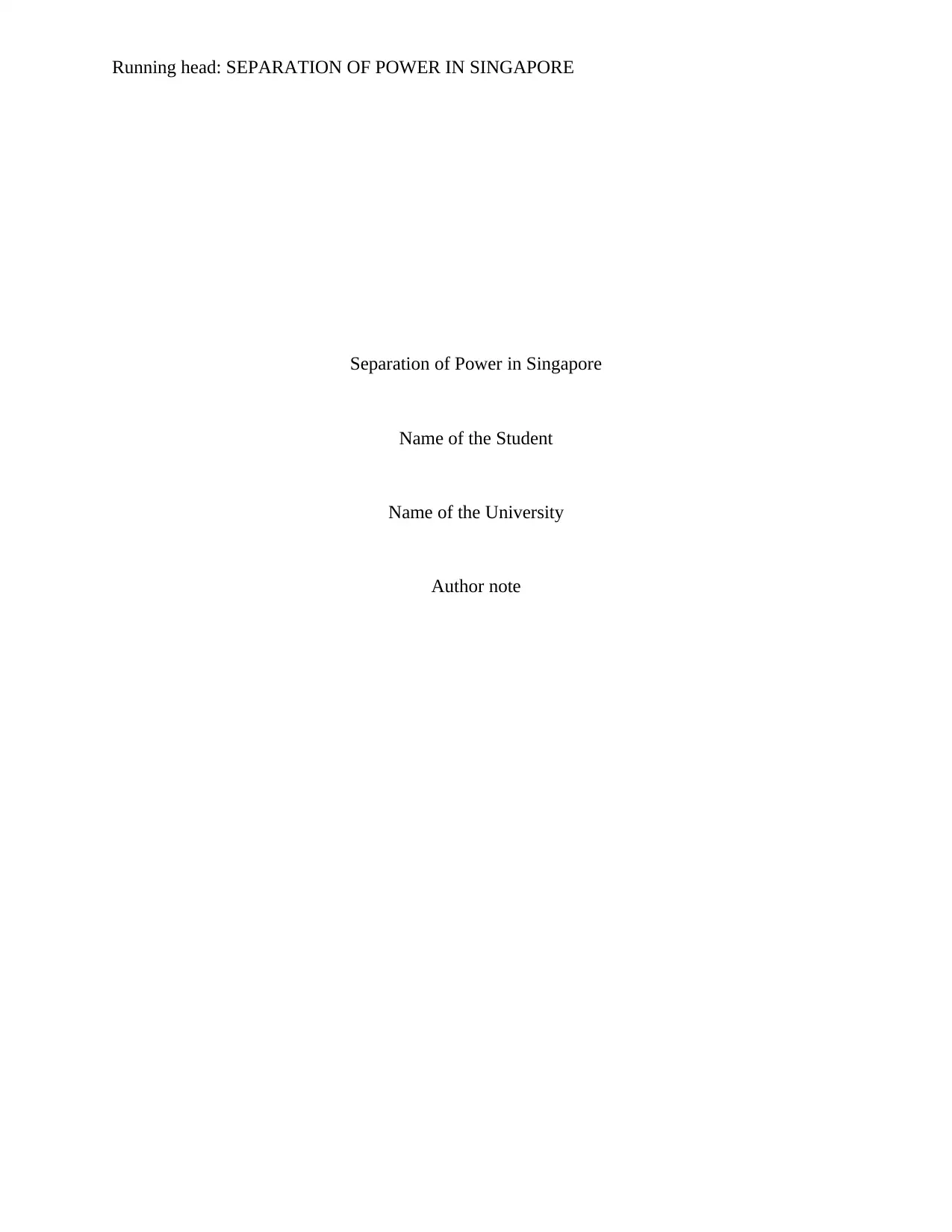
Running head: SEPARATION OF POWER IN SINGAPORE
Separation of Power in Singapore
Name of the Student
Name of the University
Author note
Separation of Power in Singapore
Name of the Student
Name of the University
Author note
Paraphrase This Document
Need a fresh take? Get an instant paraphrase of this document with our AI Paraphraser
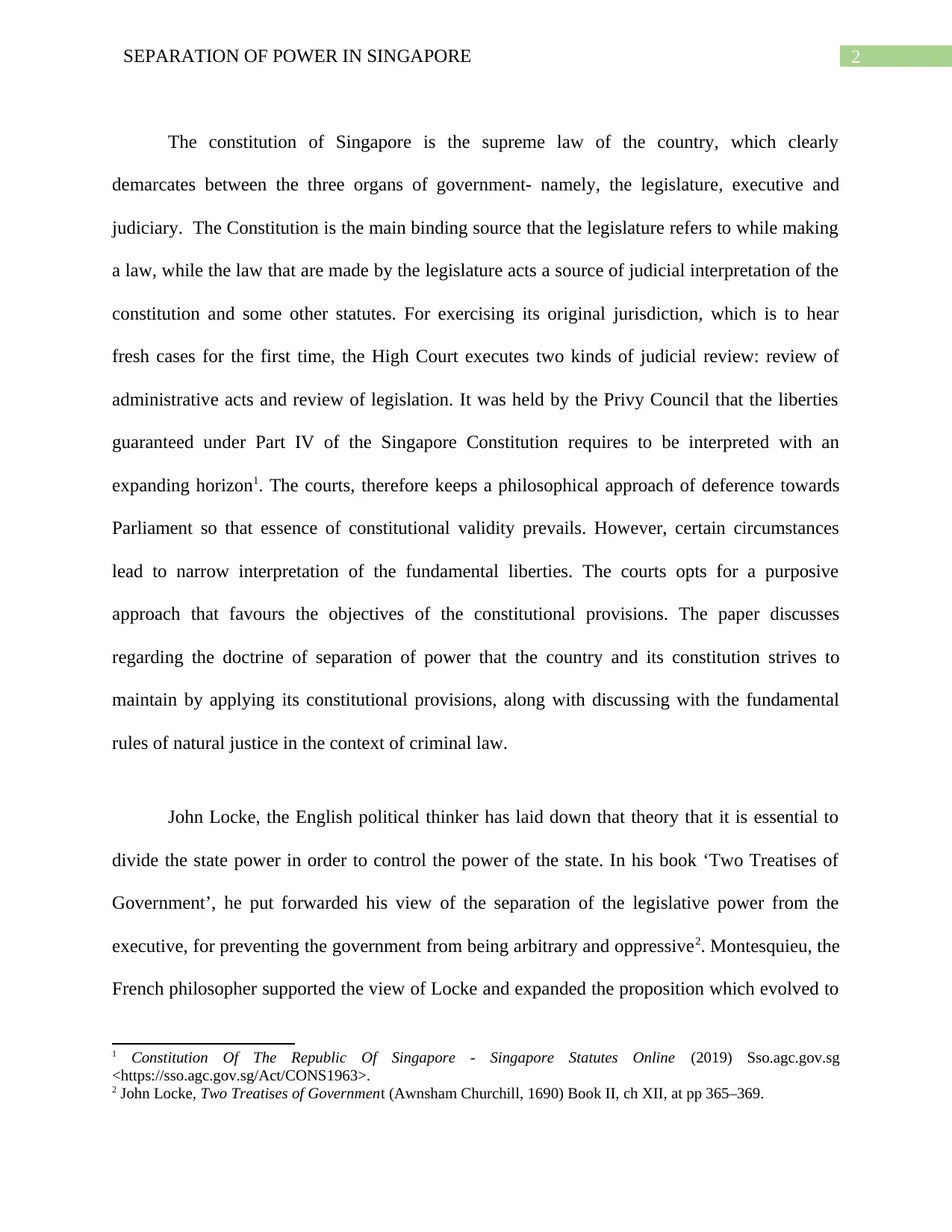
2SEPARATION OF POWER IN SINGAPORE
The constitution of Singapore is the supreme law of the country, which clearly
demarcates between the three organs of government- namely, the legislature, executive and
judiciary. The Constitution is the main binding source that the legislature refers to while making
a law, while the law that are made by the legislature acts a source of judicial interpretation of the
constitution and some other statutes. For exercising its original jurisdiction, which is to hear
fresh cases for the first time, the High Court executes two kinds of judicial review: review of
administrative acts and review of legislation. It was held by the Privy Council that the liberties
guaranteed under Part IV of the Singapore Constitution requires to be interpreted with an
expanding horizon1. The courts, therefore keeps a philosophical approach of deference towards
Parliament so that essence of constitutional validity prevails. However, certain circumstances
lead to narrow interpretation of the fundamental liberties. The courts opts for a purposive
approach that favours the objectives of the constitutional provisions. The paper discusses
regarding the doctrine of separation of power that the country and its constitution strives to
maintain by applying its constitutional provisions, along with discussing with the fundamental
rules of natural justice in the context of criminal law.
John Locke, the English political thinker has laid down that theory that it is essential to
divide the state power in order to control the power of the state. In his book ‘Two Treatises of
Government’, he put forwarded his view of the separation of the legislative power from the
executive, for preventing the government from being arbitrary and oppressive2. Montesquieu, the
French philosopher supported the view of Locke and expanded the proposition which evolved to
1 Constitution Of The Republic Of Singapore - Singapore Statutes Online (2019) Sso.agc.gov.sg
<https://sso.agc.gov.sg/Act/CONS1963>.
2 John Locke, Two Treatises of Government (Awnsham Churchill, 1690) Book II, ch XII, at pp 365–369.
The constitution of Singapore is the supreme law of the country, which clearly
demarcates between the three organs of government- namely, the legislature, executive and
judiciary. The Constitution is the main binding source that the legislature refers to while making
a law, while the law that are made by the legislature acts a source of judicial interpretation of the
constitution and some other statutes. For exercising its original jurisdiction, which is to hear
fresh cases for the first time, the High Court executes two kinds of judicial review: review of
administrative acts and review of legislation. It was held by the Privy Council that the liberties
guaranteed under Part IV of the Singapore Constitution requires to be interpreted with an
expanding horizon1. The courts, therefore keeps a philosophical approach of deference towards
Parliament so that essence of constitutional validity prevails. However, certain circumstances
lead to narrow interpretation of the fundamental liberties. The courts opts for a purposive
approach that favours the objectives of the constitutional provisions. The paper discusses
regarding the doctrine of separation of power that the country and its constitution strives to
maintain by applying its constitutional provisions, along with discussing with the fundamental
rules of natural justice in the context of criminal law.
John Locke, the English political thinker has laid down that theory that it is essential to
divide the state power in order to control the power of the state. In his book ‘Two Treatises of
Government’, he put forwarded his view of the separation of the legislative power from the
executive, for preventing the government from being arbitrary and oppressive2. Montesquieu, the
French philosopher supported the view of Locke and expanded the proposition which evolved to
1 Constitution Of The Republic Of Singapore - Singapore Statutes Online (2019) Sso.agc.gov.sg
<https://sso.agc.gov.sg/Act/CONS1963>.
2 John Locke, Two Treatises of Government (Awnsham Churchill, 1690) Book II, ch XII, at pp 365–369.
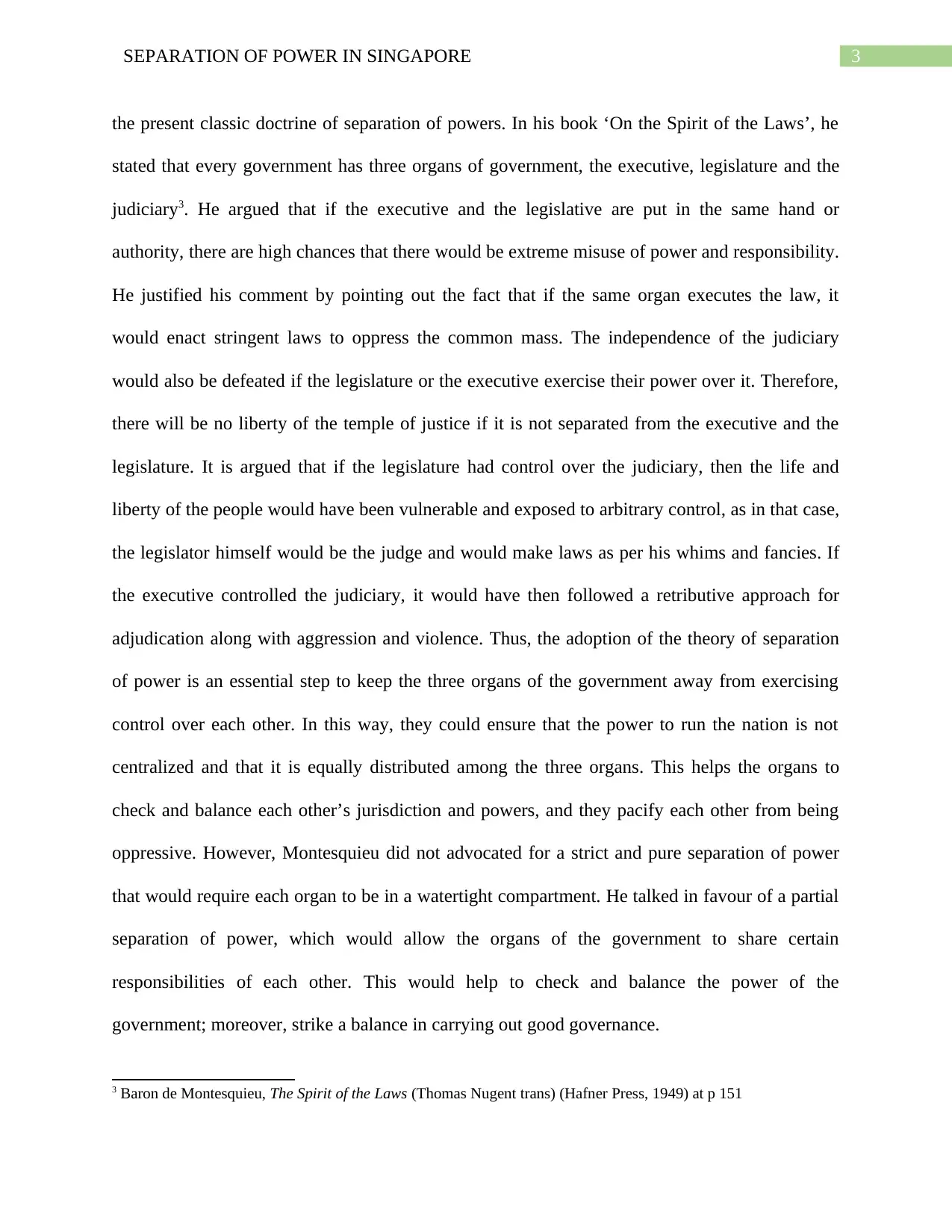
3SEPARATION OF POWER IN SINGAPORE
the present classic doctrine of separation of powers. In his book ‘On the Spirit of the Laws’, he
stated that every government has three organs of government, the executive, legislature and the
judiciary3. He argued that if the executive and the legislative are put in the same hand or
authority, there are high chances that there would be extreme misuse of power and responsibility.
He justified his comment by pointing out the fact that if the same organ executes the law, it
would enact stringent laws to oppress the common mass. The independence of the judiciary
would also be defeated if the legislature or the executive exercise their power over it. Therefore,
there will be no liberty of the temple of justice if it is not separated from the executive and the
legislature. It is argued that if the legislature had control over the judiciary, then the life and
liberty of the people would have been vulnerable and exposed to arbitrary control, as in that case,
the legislator himself would be the judge and would make laws as per his whims and fancies. If
the executive controlled the judiciary, it would have then followed a retributive approach for
adjudication along with aggression and violence. Thus, the adoption of the theory of separation
of power is an essential step to keep the three organs of the government away from exercising
control over each other. In this way, they could ensure that the power to run the nation is not
centralized and that it is equally distributed among the three organs. This helps the organs to
check and balance each other’s jurisdiction and powers, and they pacify each other from being
oppressive. However, Montesquieu did not advocated for a strict and pure separation of power
that would require each organ to be in a watertight compartment. He talked in favour of a partial
separation of power, which would allow the organs of the government to share certain
responsibilities of each other. This would help to check and balance the power of the
government; moreover, strike a balance in carrying out good governance.
3 Baron de Montesquieu, The Spirit of the Laws (Thomas Nugent trans) (Hafner Press, 1949) at p 151
the present classic doctrine of separation of powers. In his book ‘On the Spirit of the Laws’, he
stated that every government has three organs of government, the executive, legislature and the
judiciary3. He argued that if the executive and the legislative are put in the same hand or
authority, there are high chances that there would be extreme misuse of power and responsibility.
He justified his comment by pointing out the fact that if the same organ executes the law, it
would enact stringent laws to oppress the common mass. The independence of the judiciary
would also be defeated if the legislature or the executive exercise their power over it. Therefore,
there will be no liberty of the temple of justice if it is not separated from the executive and the
legislature. It is argued that if the legislature had control over the judiciary, then the life and
liberty of the people would have been vulnerable and exposed to arbitrary control, as in that case,
the legislator himself would be the judge and would make laws as per his whims and fancies. If
the executive controlled the judiciary, it would have then followed a retributive approach for
adjudication along with aggression and violence. Thus, the adoption of the theory of separation
of power is an essential step to keep the three organs of the government away from exercising
control over each other. In this way, they could ensure that the power to run the nation is not
centralized and that it is equally distributed among the three organs. This helps the organs to
check and balance each other’s jurisdiction and powers, and they pacify each other from being
oppressive. However, Montesquieu did not advocated for a strict and pure separation of power
that would require each organ to be in a watertight compartment. He talked in favour of a partial
separation of power, which would allow the organs of the government to share certain
responsibilities of each other. This would help to check and balance the power of the
government; moreover, strike a balance in carrying out good governance.
3 Baron de Montesquieu, The Spirit of the Laws (Thomas Nugent trans) (Hafner Press, 1949) at p 151
⊘ This is a preview!⊘
Do you want full access?
Subscribe today to unlock all pages.

Trusted by 1+ million students worldwide
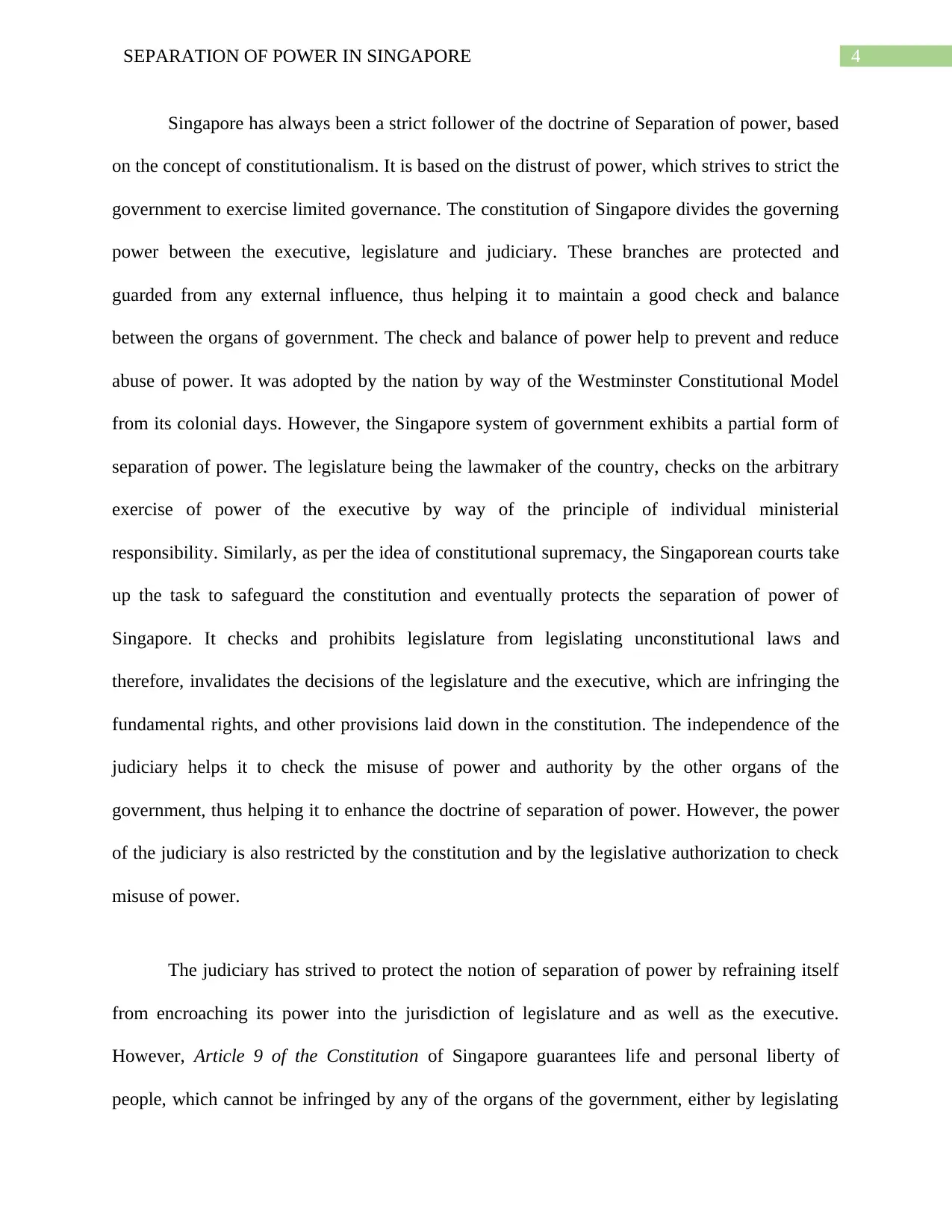
4SEPARATION OF POWER IN SINGAPORE
Singapore has always been a strict follower of the doctrine of Separation of power, based
on the concept of constitutionalism. It is based on the distrust of power, which strives to strict the
government to exercise limited governance. The constitution of Singapore divides the governing
power between the executive, legislature and judiciary. These branches are protected and
guarded from any external influence, thus helping it to maintain a good check and balance
between the organs of government. The check and balance of power help to prevent and reduce
abuse of power. It was adopted by the nation by way of the Westminster Constitutional Model
from its colonial days. However, the Singapore system of government exhibits a partial form of
separation of power. The legislature being the lawmaker of the country, checks on the arbitrary
exercise of power of the executive by way of the principle of individual ministerial
responsibility. Similarly, as per the idea of constitutional supremacy, the Singaporean courts take
up the task to safeguard the constitution and eventually protects the separation of power of
Singapore. It checks and prohibits legislature from legislating unconstitutional laws and
therefore, invalidates the decisions of the legislature and the executive, which are infringing the
fundamental rights, and other provisions laid down in the constitution. The independence of the
judiciary helps it to check the misuse of power and authority by the other organs of the
government, thus helping it to enhance the doctrine of separation of power. However, the power
of the judiciary is also restricted by the constitution and by the legislative authorization to check
misuse of power.
The judiciary has strived to protect the notion of separation of power by refraining itself
from encroaching its power into the jurisdiction of legislature and as well as the executive.
However, Article 9 of the Constitution of Singapore guarantees life and personal liberty of
people, which cannot be infringed by any of the organs of the government, either by legislating
Singapore has always been a strict follower of the doctrine of Separation of power, based
on the concept of constitutionalism. It is based on the distrust of power, which strives to strict the
government to exercise limited governance. The constitution of Singapore divides the governing
power between the executive, legislature and judiciary. These branches are protected and
guarded from any external influence, thus helping it to maintain a good check and balance
between the organs of government. The check and balance of power help to prevent and reduce
abuse of power. It was adopted by the nation by way of the Westminster Constitutional Model
from its colonial days. However, the Singapore system of government exhibits a partial form of
separation of power. The legislature being the lawmaker of the country, checks on the arbitrary
exercise of power of the executive by way of the principle of individual ministerial
responsibility. Similarly, as per the idea of constitutional supremacy, the Singaporean courts take
up the task to safeguard the constitution and eventually protects the separation of power of
Singapore. It checks and prohibits legislature from legislating unconstitutional laws and
therefore, invalidates the decisions of the legislature and the executive, which are infringing the
fundamental rights, and other provisions laid down in the constitution. The independence of the
judiciary helps it to check the misuse of power and authority by the other organs of the
government, thus helping it to enhance the doctrine of separation of power. However, the power
of the judiciary is also restricted by the constitution and by the legislative authorization to check
misuse of power.
The judiciary has strived to protect the notion of separation of power by refraining itself
from encroaching its power into the jurisdiction of legislature and as well as the executive.
However, Article 9 of the Constitution of Singapore guarantees life and personal liberty of
people, which cannot be infringed by any of the organs of the government, either by legislating
Paraphrase This Document
Need a fresh take? Get an instant paraphrase of this document with our AI Paraphraser
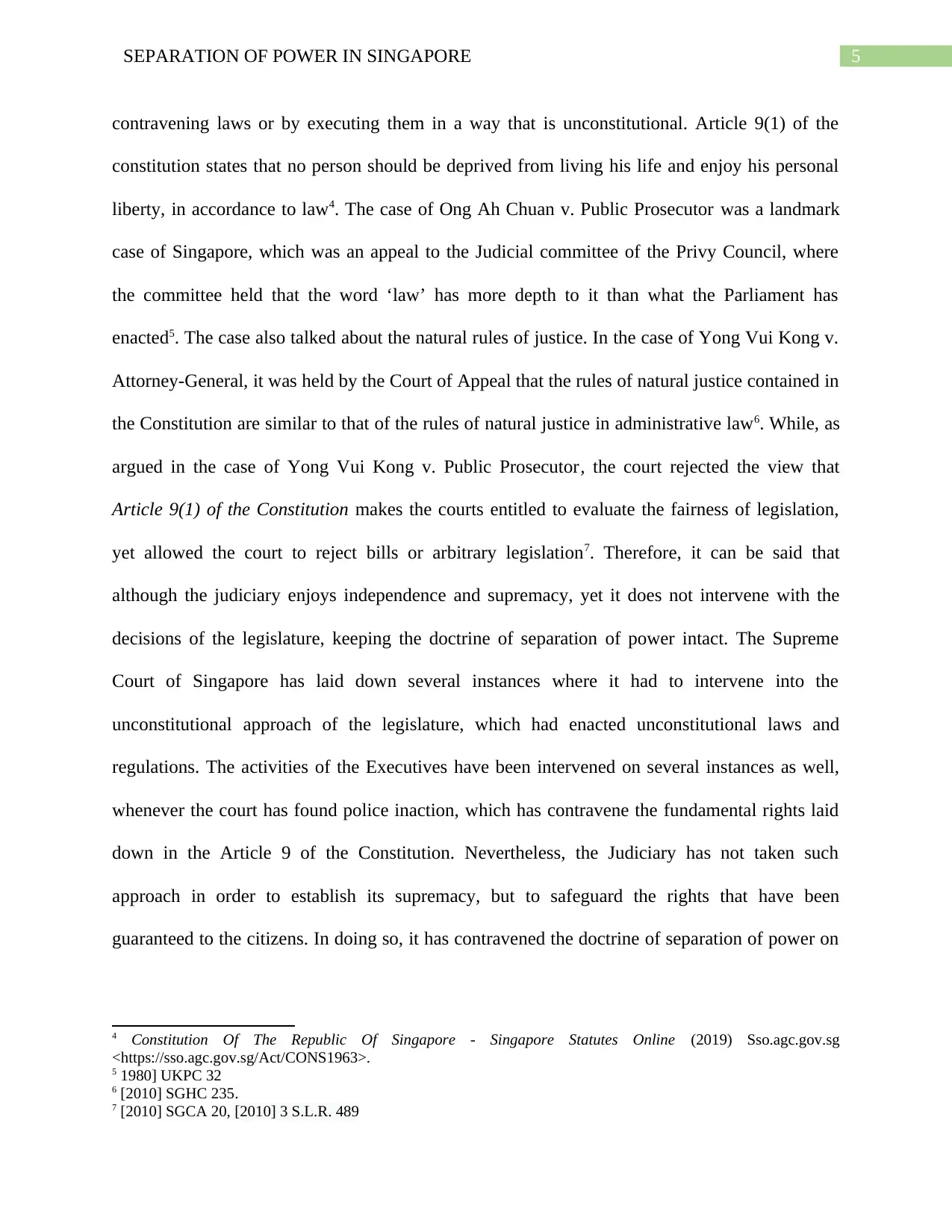
5SEPARATION OF POWER IN SINGAPORE
contravening laws or by executing them in a way that is unconstitutional. Article 9(1) of the
constitution states that no person should be deprived from living his life and enjoy his personal
liberty, in accordance to law4. The case of Ong Ah Chuan v. Public Prosecutor was a landmark
case of Singapore, which was an appeal to the Judicial committee of the Privy Council, where
the committee held that the word ‘law’ has more depth to it than what the Parliament has
enacted5. The case also talked about the natural rules of justice. In the case of Yong Vui Kong v.
Attorney-General, it was held by the Court of Appeal that the rules of natural justice contained in
the Constitution are similar to that of the rules of natural justice in administrative law6. While, as
argued in the case of Yong Vui Kong v. Public Prosecutor, the court rejected the view that
Article 9(1) of the Constitution makes the courts entitled to evaluate the fairness of legislation,
yet allowed the court to reject bills or arbitrary legislation7. Therefore, it can be said that
although the judiciary enjoys independence and supremacy, yet it does not intervene with the
decisions of the legislature, keeping the doctrine of separation of power intact. The Supreme
Court of Singapore has laid down several instances where it had to intervene into the
unconstitutional approach of the legislature, which had enacted unconstitutional laws and
regulations. The activities of the Executives have been intervened on several instances as well,
whenever the court has found police inaction, which has contravene the fundamental rights laid
down in the Article 9 of the Constitution. Nevertheless, the Judiciary has not taken such
approach in order to establish its supremacy, but to safeguard the rights that have been
guaranteed to the citizens. In doing so, it has contravened the doctrine of separation of power on
4 Constitution Of The Republic Of Singapore - Singapore Statutes Online (2019) Sso.agc.gov.sg
<https://sso.agc.gov.sg/Act/CONS1963>.
5 1980] UKPC 32
6 [2010] SGHC 235.
7 [2010] SGCA 20, [2010] 3 S.L.R. 489
contravening laws or by executing them in a way that is unconstitutional. Article 9(1) of the
constitution states that no person should be deprived from living his life and enjoy his personal
liberty, in accordance to law4. The case of Ong Ah Chuan v. Public Prosecutor was a landmark
case of Singapore, which was an appeal to the Judicial committee of the Privy Council, where
the committee held that the word ‘law’ has more depth to it than what the Parliament has
enacted5. The case also talked about the natural rules of justice. In the case of Yong Vui Kong v.
Attorney-General, it was held by the Court of Appeal that the rules of natural justice contained in
the Constitution are similar to that of the rules of natural justice in administrative law6. While, as
argued in the case of Yong Vui Kong v. Public Prosecutor, the court rejected the view that
Article 9(1) of the Constitution makes the courts entitled to evaluate the fairness of legislation,
yet allowed the court to reject bills or arbitrary legislation7. Therefore, it can be said that
although the judiciary enjoys independence and supremacy, yet it does not intervene with the
decisions of the legislature, keeping the doctrine of separation of power intact. The Supreme
Court of Singapore has laid down several instances where it had to intervene into the
unconstitutional approach of the legislature, which had enacted unconstitutional laws and
regulations. The activities of the Executives have been intervened on several instances as well,
whenever the court has found police inaction, which has contravene the fundamental rights laid
down in the Article 9 of the Constitution. Nevertheless, the Judiciary has not taken such
approach in order to establish its supremacy, but to safeguard the rights that have been
guaranteed to the citizens. In doing so, it has contravened the doctrine of separation of power on
4 Constitution Of The Republic Of Singapore - Singapore Statutes Online (2019) Sso.agc.gov.sg
<https://sso.agc.gov.sg/Act/CONS1963>.
5 1980] UKPC 32
6 [2010] SGHC 235.
7 [2010] SGCA 20, [2010] 3 S.L.R. 489
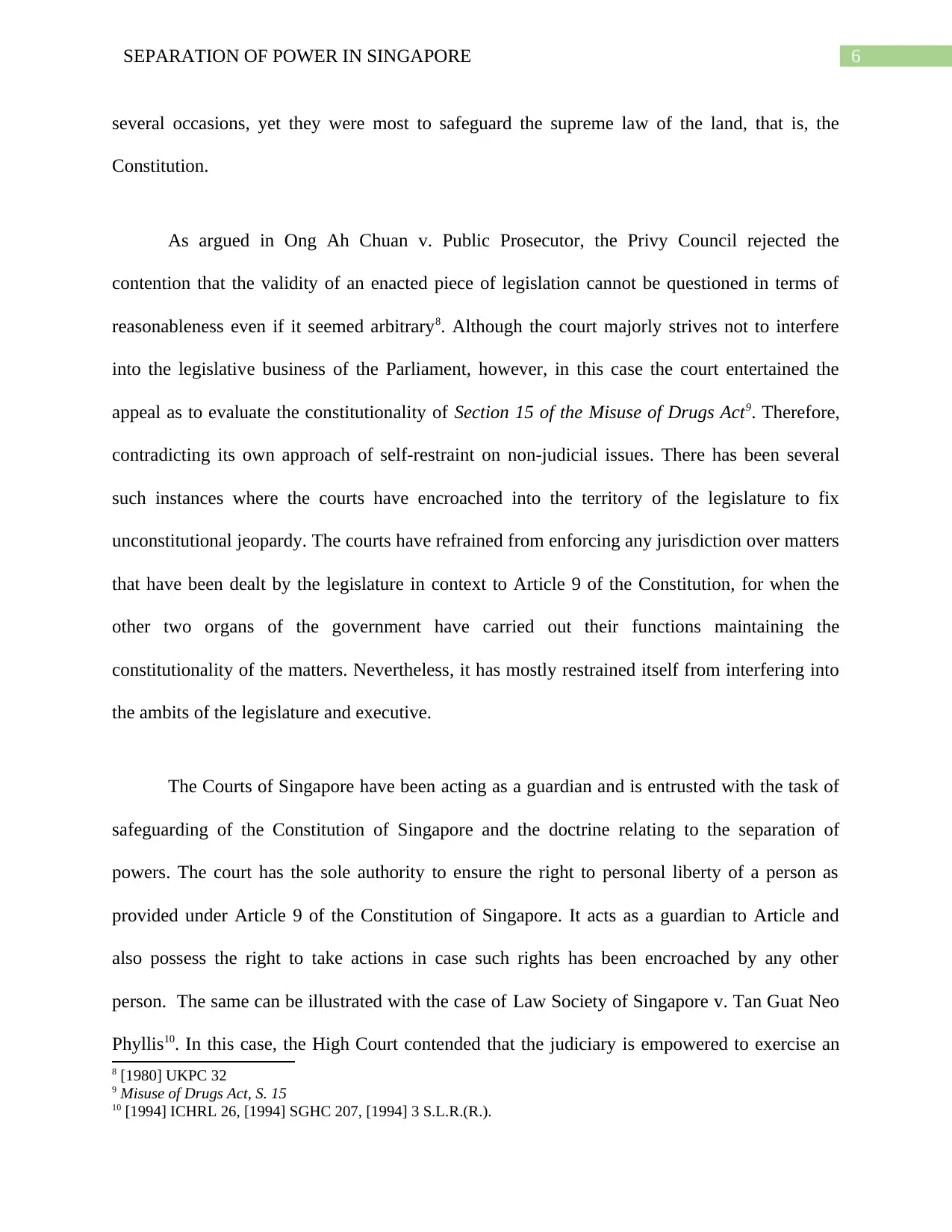
6SEPARATION OF POWER IN SINGAPORE
several occasions, yet they were most to safeguard the supreme law of the land, that is, the
Constitution.
As argued in Ong Ah Chuan v. Public Prosecutor, the Privy Council rejected the
contention that the validity of an enacted piece of legislation cannot be questioned in terms of
reasonableness even if it seemed arbitrary8. Although the court majorly strives not to interfere
into the legislative business of the Parliament, however, in this case the court entertained the
appeal as to evaluate the constitutionality of Section 15 of the Misuse of Drugs Act9. Therefore,
contradicting its own approach of self-restraint on non-judicial issues. There has been several
such instances where the courts have encroached into the territory of the legislature to fix
unconstitutional jeopardy. The courts have refrained from enforcing any jurisdiction over matters
that have been dealt by the legislature in context to Article 9 of the Constitution, for when the
other two organs of the government have carried out their functions maintaining the
constitutionality of the matters. Nevertheless, it has mostly restrained itself from interfering into
the ambits of the legislature and executive.
The Courts of Singapore have been acting as a guardian and is entrusted with the task of
safeguarding of the Constitution of Singapore and the doctrine relating to the separation of
powers. The court has the sole authority to ensure the right to personal liberty of a person as
provided under Article 9 of the Constitution of Singapore. It acts as a guardian to Article and
also possess the right to take actions in case such rights has been encroached by any other
person. The same can be illustrated with the case of Law Society of Singapore v. Tan Guat Neo
Phyllis10. In this case, the High Court contended that the judiciary is empowered to exercise an
8 [1980] UKPC 32
9 Misuse of Drugs Act, S. 15
10 [1994] ICHRL 26, [1994] SGHC 207, [1994] 3 S.L.R.(R.).
several occasions, yet they were most to safeguard the supreme law of the land, that is, the
Constitution.
As argued in Ong Ah Chuan v. Public Prosecutor, the Privy Council rejected the
contention that the validity of an enacted piece of legislation cannot be questioned in terms of
reasonableness even if it seemed arbitrary8. Although the court majorly strives not to interfere
into the legislative business of the Parliament, however, in this case the court entertained the
appeal as to evaluate the constitutionality of Section 15 of the Misuse of Drugs Act9. Therefore,
contradicting its own approach of self-restraint on non-judicial issues. There has been several
such instances where the courts have encroached into the territory of the legislature to fix
unconstitutional jeopardy. The courts have refrained from enforcing any jurisdiction over matters
that have been dealt by the legislature in context to Article 9 of the Constitution, for when the
other two organs of the government have carried out their functions maintaining the
constitutionality of the matters. Nevertheless, it has mostly restrained itself from interfering into
the ambits of the legislature and executive.
The Courts of Singapore have been acting as a guardian and is entrusted with the task of
safeguarding of the Constitution of Singapore and the doctrine relating to the separation of
powers. The court has the sole authority to ensure the right to personal liberty of a person as
provided under Article 9 of the Constitution of Singapore. It acts as a guardian to Article and
also possess the right to take actions in case such rights has been encroached by any other
person. The same can be illustrated with the case of Law Society of Singapore v. Tan Guat Neo
Phyllis10. In this case, the High Court contended that the judiciary is empowered to exercise an
8 [1980] UKPC 32
9 Misuse of Drugs Act, S. 15
10 [1994] ICHRL 26, [1994] SGHC 207, [1994] 3 S.L.R.(R.).
⊘ This is a preview!⊘
Do you want full access?
Subscribe today to unlock all pages.

Trusted by 1+ million students worldwide
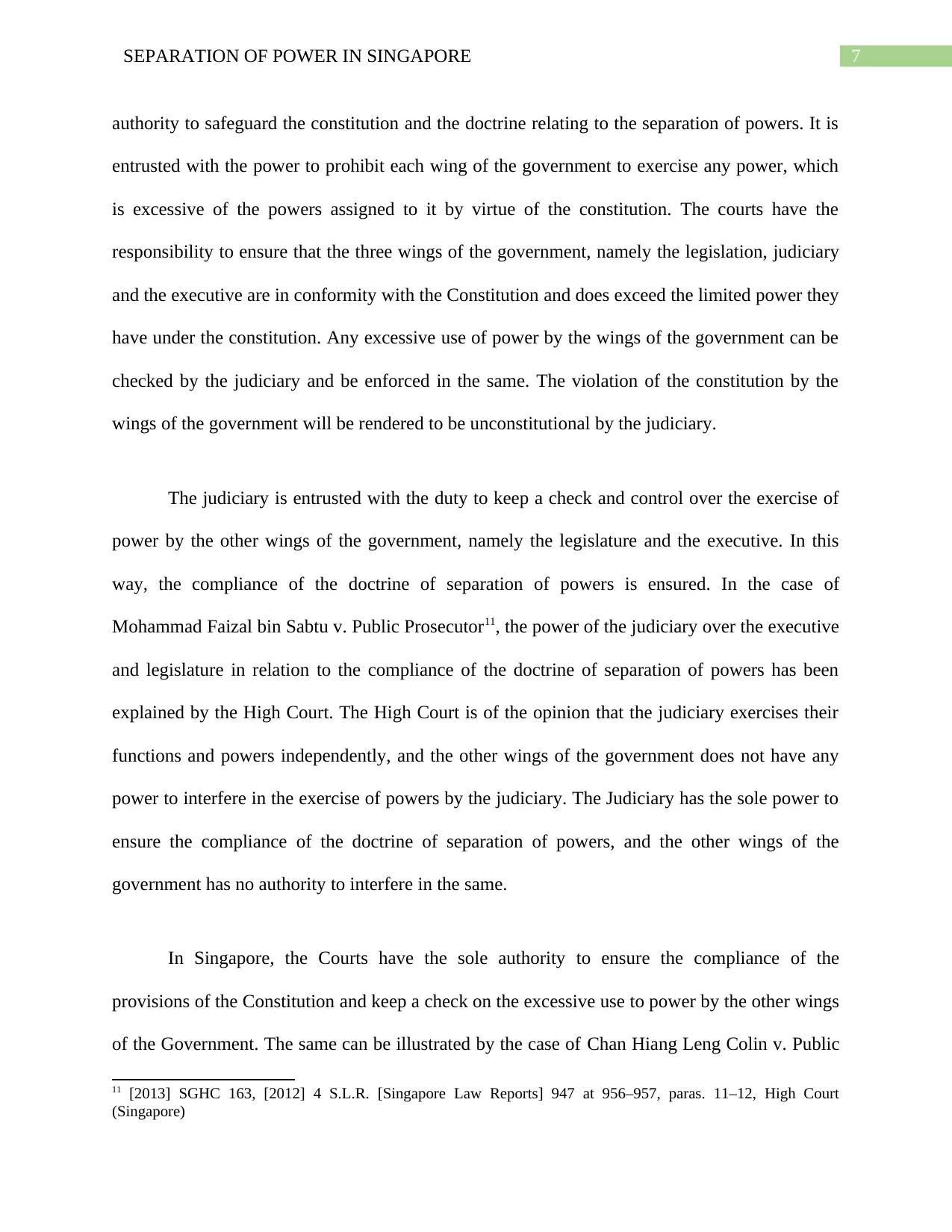
7SEPARATION OF POWER IN SINGAPORE
authority to safeguard the constitution and the doctrine relating to the separation of powers. It is
entrusted with the power to prohibit each wing of the government to exercise any power, which
is excessive of the powers assigned to it by virtue of the constitution. The courts have the
responsibility to ensure that the three wings of the government, namely the legislation, judiciary
and the executive are in conformity with the Constitution and does exceed the limited power they
have under the constitution. Any excessive use of power by the wings of the government can be
checked by the judiciary and be enforced in the same. The violation of the constitution by the
wings of the government will be rendered to be unconstitutional by the judiciary.
The judiciary is entrusted with the duty to keep a check and control over the exercise of
power by the other wings of the government, namely the legislature and the executive. In this
way, the compliance of the doctrine of separation of powers is ensured. In the case of
Mohammad Faizal bin Sabtu v. Public Prosecutor11, the power of the judiciary over the executive
and legislature in relation to the compliance of the doctrine of separation of powers has been
explained by the High Court. The High Court is of the opinion that the judiciary exercises their
functions and powers independently, and the other wings of the government does not have any
power to interfere in the exercise of powers by the judiciary. The Judiciary has the sole power to
ensure the compliance of the doctrine of separation of powers, and the other wings of the
government has no authority to interfere in the same.
In Singapore, the Courts have the sole authority to ensure the compliance of the
provisions of the Constitution and keep a check on the excessive use to power by the other wings
of the Government. The same can be illustrated by the case of Chan Hiang Leng Colin v. Public
11 [2013] SGHC 163, [2012] 4 S.L.R. [Singapore Law Reports] 947 at 956–957, paras. 11–12, High Court
(Singapore)
authority to safeguard the constitution and the doctrine relating to the separation of powers. It is
entrusted with the power to prohibit each wing of the government to exercise any power, which
is excessive of the powers assigned to it by virtue of the constitution. The courts have the
responsibility to ensure that the three wings of the government, namely the legislation, judiciary
and the executive are in conformity with the Constitution and does exceed the limited power they
have under the constitution. Any excessive use of power by the wings of the government can be
checked by the judiciary and be enforced in the same. The violation of the constitution by the
wings of the government will be rendered to be unconstitutional by the judiciary.
The judiciary is entrusted with the duty to keep a check and control over the exercise of
power by the other wings of the government, namely the legislature and the executive. In this
way, the compliance of the doctrine of separation of powers is ensured. In the case of
Mohammad Faizal bin Sabtu v. Public Prosecutor11, the power of the judiciary over the executive
and legislature in relation to the compliance of the doctrine of separation of powers has been
explained by the High Court. The High Court is of the opinion that the judiciary exercises their
functions and powers independently, and the other wings of the government does not have any
power to interfere in the exercise of powers by the judiciary. The Judiciary has the sole power to
ensure the compliance of the doctrine of separation of powers, and the other wings of the
government has no authority to interfere in the same.
In Singapore, the Courts have the sole authority to ensure the compliance of the
provisions of the Constitution and keep a check on the excessive use to power by the other wings
of the Government. The same can be illustrated by the case of Chan Hiang Leng Colin v. Public
11 [2013] SGHC 163, [2012] 4 S.L.R. [Singapore Law Reports] 947 at 956–957, paras. 11–12, High Court
(Singapore)
Paraphrase This Document
Need a fresh take? Get an instant paraphrase of this document with our AI Paraphraser
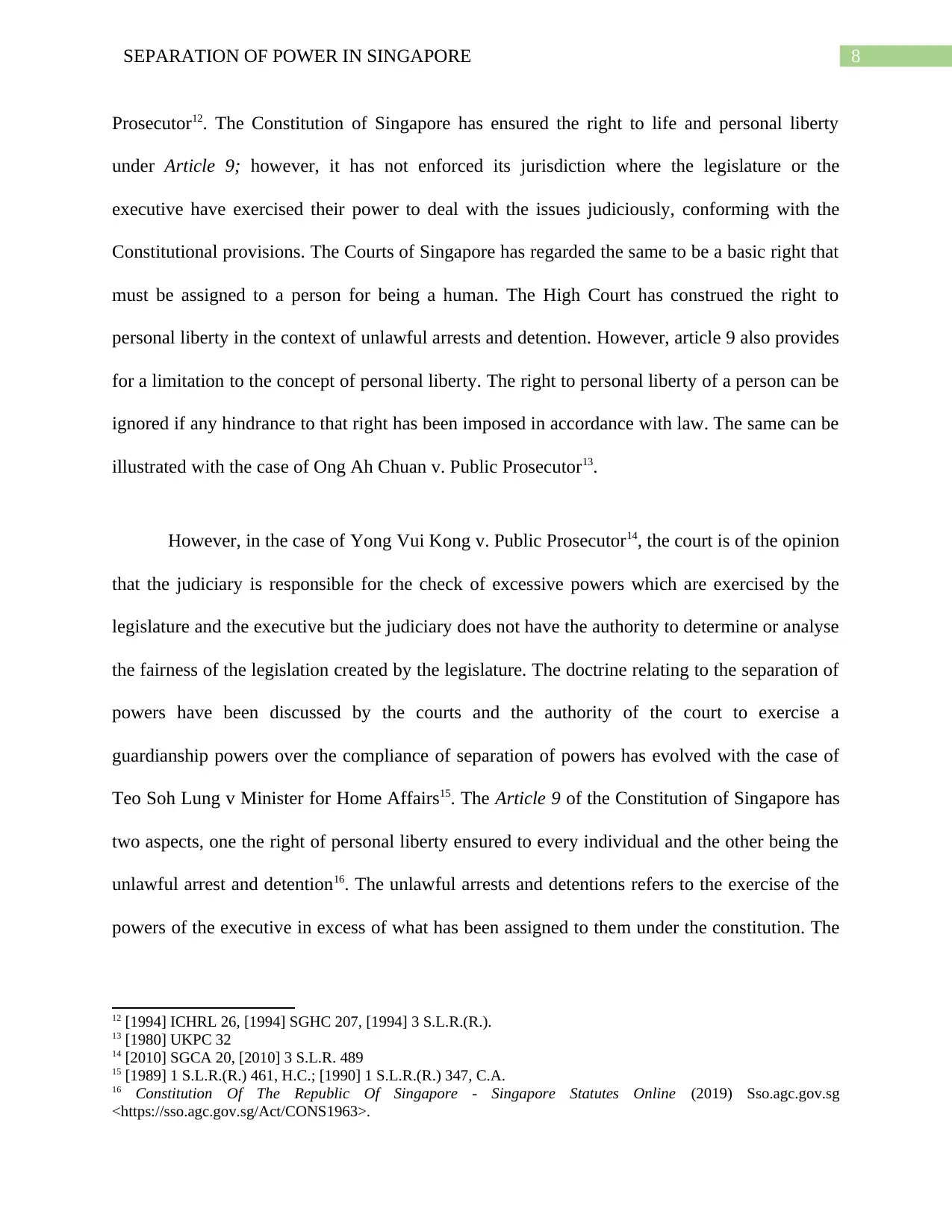
8SEPARATION OF POWER IN SINGAPORE
Prosecutor12. The Constitution of Singapore has ensured the right to life and personal liberty
under Article 9; however, it has not enforced its jurisdiction where the legislature or the
executive have exercised their power to deal with the issues judiciously, conforming with the
Constitutional provisions. The Courts of Singapore has regarded the same to be a basic right that
must be assigned to a person for being a human. The High Court has construed the right to
personal liberty in the context of unlawful arrests and detention. However, article 9 also provides
for a limitation to the concept of personal liberty. The right to personal liberty of a person can be
ignored if any hindrance to that right has been imposed in accordance with law. The same can be
illustrated with the case of Ong Ah Chuan v. Public Prosecutor13.
However, in the case of Yong Vui Kong v. Public Prosecutor14, the court is of the opinion
that the judiciary is responsible for the check of excessive powers which are exercised by the
legislature and the executive but the judiciary does not have the authority to determine or analyse
the fairness of the legislation created by the legislature. The doctrine relating to the separation of
powers have been discussed by the courts and the authority of the court to exercise a
guardianship powers over the compliance of separation of powers has evolved with the case of
Teo Soh Lung v Minister for Home Affairs15. The Article 9 of the Constitution of Singapore has
two aspects, one the right of personal liberty ensured to every individual and the other being the
unlawful arrest and detention16. The unlawful arrests and detentions refers to the exercise of the
powers of the executive in excess of what has been assigned to them under the constitution. The
12 [1994] ICHRL 26, [1994] SGHC 207, [1994] 3 S.L.R.(R.).
13 [1980] UKPC 32
14 [2010] SGCA 20, [2010] 3 S.L.R. 489
15 [1989] 1 S.L.R.(R.) 461, H.C.; [1990] 1 S.L.R.(R.) 347, C.A.
16 Constitution Of The Republic Of Singapore - Singapore Statutes Online (2019) Sso.agc.gov.sg
<https://sso.agc.gov.sg/Act/CONS1963>.
Prosecutor12. The Constitution of Singapore has ensured the right to life and personal liberty
under Article 9; however, it has not enforced its jurisdiction where the legislature or the
executive have exercised their power to deal with the issues judiciously, conforming with the
Constitutional provisions. The Courts of Singapore has regarded the same to be a basic right that
must be assigned to a person for being a human. The High Court has construed the right to
personal liberty in the context of unlawful arrests and detention. However, article 9 also provides
for a limitation to the concept of personal liberty. The right to personal liberty of a person can be
ignored if any hindrance to that right has been imposed in accordance with law. The same can be
illustrated with the case of Ong Ah Chuan v. Public Prosecutor13.
However, in the case of Yong Vui Kong v. Public Prosecutor14, the court is of the opinion
that the judiciary is responsible for the check of excessive powers which are exercised by the
legislature and the executive but the judiciary does not have the authority to determine or analyse
the fairness of the legislation created by the legislature. The doctrine relating to the separation of
powers have been discussed by the courts and the authority of the court to exercise a
guardianship powers over the compliance of separation of powers has evolved with the case of
Teo Soh Lung v Minister for Home Affairs15. The Article 9 of the Constitution of Singapore has
two aspects, one the right of personal liberty ensured to every individual and the other being the
unlawful arrest and detention16. The unlawful arrests and detentions refers to the exercise of the
powers of the executive in excess of what has been assigned to them under the constitution. The
12 [1994] ICHRL 26, [1994] SGHC 207, [1994] 3 S.L.R.(R.).
13 [1980] UKPC 32
14 [2010] SGCA 20, [2010] 3 S.L.R. 489
15 [1989] 1 S.L.R.(R.) 461, H.C.; [1990] 1 S.L.R.(R.) 347, C.A.
16 Constitution Of The Republic Of Singapore - Singapore Statutes Online (2019) Sso.agc.gov.sg
<https://sso.agc.gov.sg/Act/CONS1963>.
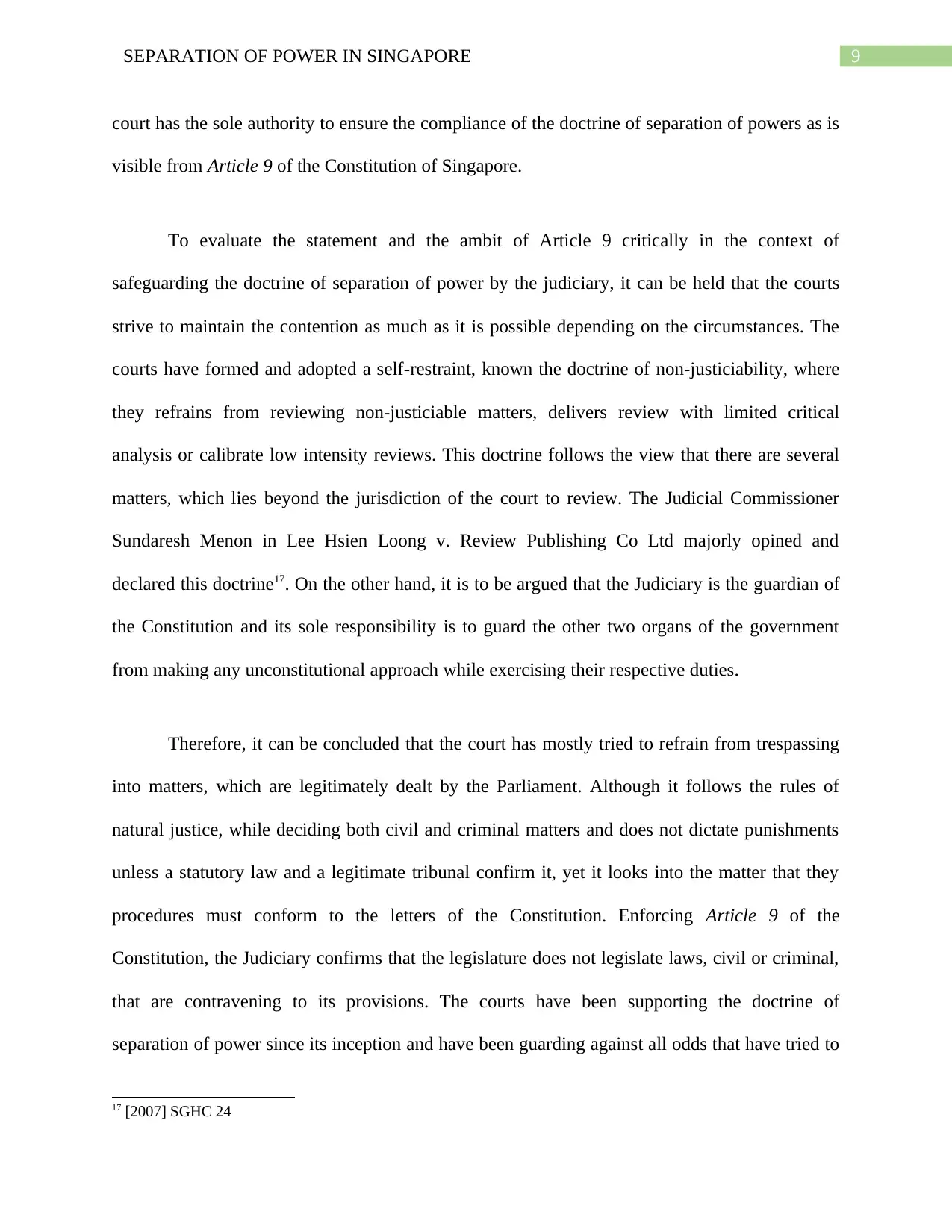
9SEPARATION OF POWER IN SINGAPORE
court has the sole authority to ensure the compliance of the doctrine of separation of powers as is
visible from Article 9 of the Constitution of Singapore.
To evaluate the statement and the ambit of Article 9 critically in the context of
safeguarding the doctrine of separation of power by the judiciary, it can be held that the courts
strive to maintain the contention as much as it is possible depending on the circumstances. The
courts have formed and adopted a self-restraint, known the doctrine of non-justiciability, where
they refrains from reviewing non-justiciable matters, delivers review with limited critical
analysis or calibrate low intensity reviews. This doctrine follows the view that there are several
matters, which lies beyond the jurisdiction of the court to review. The Judicial Commissioner
Sundaresh Menon in Lee Hsien Loong v. Review Publishing Co Ltd majorly opined and
declared this doctrine17. On the other hand, it is to be argued that the Judiciary is the guardian of
the Constitution and its sole responsibility is to guard the other two organs of the government
from making any unconstitutional approach while exercising their respective duties.
Therefore, it can be concluded that the court has mostly tried to refrain from trespassing
into matters, which are legitimately dealt by the Parliament. Although it follows the rules of
natural justice, while deciding both civil and criminal matters and does not dictate punishments
unless a statutory law and a legitimate tribunal confirm it, yet it looks into the matter that they
procedures must conform to the letters of the Constitution. Enforcing Article 9 of the
Constitution, the Judiciary confirms that the legislature does not legislate laws, civil or criminal,
that are contravening to its provisions. The courts have been supporting the doctrine of
separation of power since its inception and have been guarding against all odds that have tried to
17 [2007] SGHC 24
court has the sole authority to ensure the compliance of the doctrine of separation of powers as is
visible from Article 9 of the Constitution of Singapore.
To evaluate the statement and the ambit of Article 9 critically in the context of
safeguarding the doctrine of separation of power by the judiciary, it can be held that the courts
strive to maintain the contention as much as it is possible depending on the circumstances. The
courts have formed and adopted a self-restraint, known the doctrine of non-justiciability, where
they refrains from reviewing non-justiciable matters, delivers review with limited critical
analysis or calibrate low intensity reviews. This doctrine follows the view that there are several
matters, which lies beyond the jurisdiction of the court to review. The Judicial Commissioner
Sundaresh Menon in Lee Hsien Loong v. Review Publishing Co Ltd majorly opined and
declared this doctrine17. On the other hand, it is to be argued that the Judiciary is the guardian of
the Constitution and its sole responsibility is to guard the other two organs of the government
from making any unconstitutional approach while exercising their respective duties.
Therefore, it can be concluded that the court has mostly tried to refrain from trespassing
into matters, which are legitimately dealt by the Parliament. Although it follows the rules of
natural justice, while deciding both civil and criminal matters and does not dictate punishments
unless a statutory law and a legitimate tribunal confirm it, yet it looks into the matter that they
procedures must conform to the letters of the Constitution. Enforcing Article 9 of the
Constitution, the Judiciary confirms that the legislature does not legislate laws, civil or criminal,
that are contravening to its provisions. The courts have been supporting the doctrine of
separation of power since its inception and have been guarding against all odds that have tried to
17 [2007] SGHC 24
⊘ This is a preview!⊘
Do you want full access?
Subscribe today to unlock all pages.

Trusted by 1+ million students worldwide
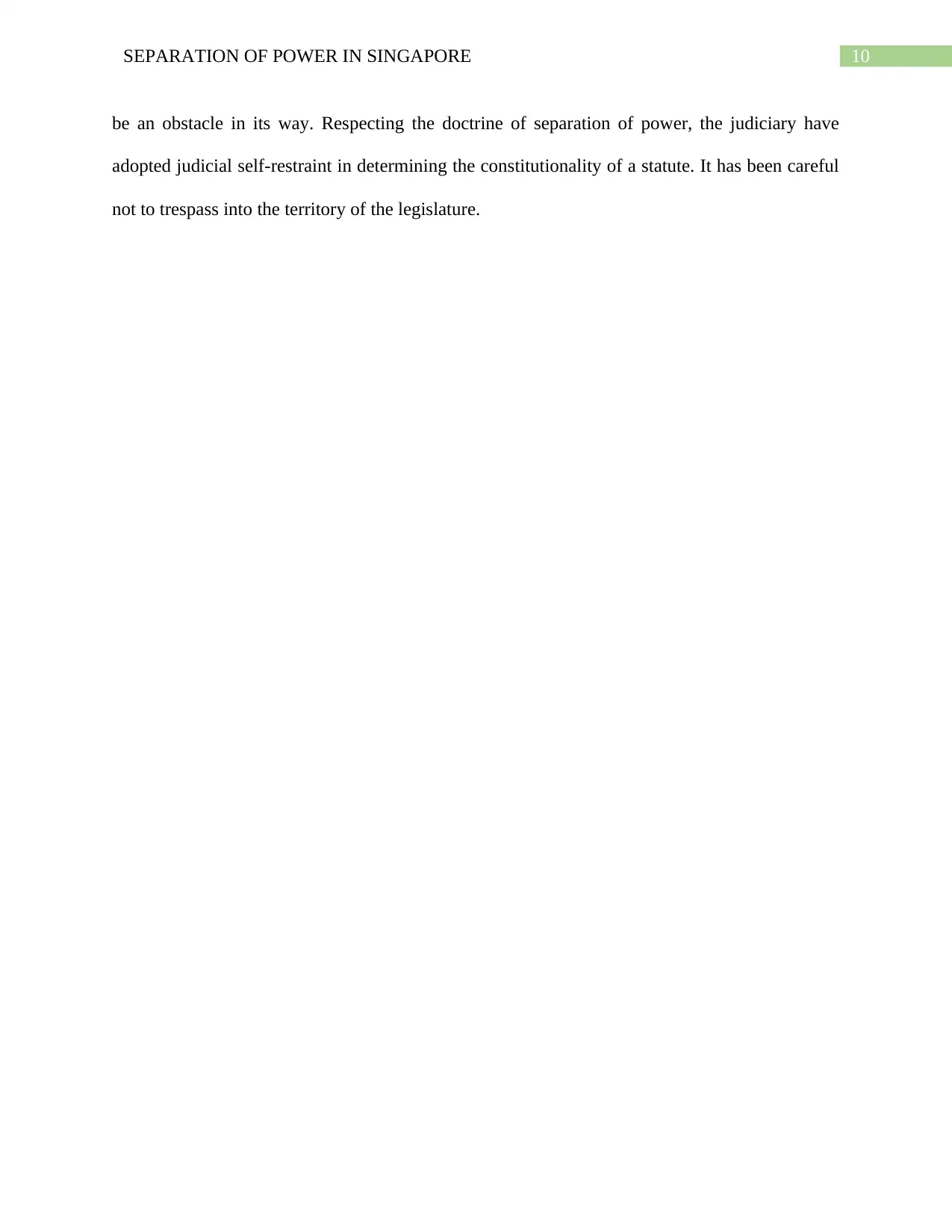
10SEPARATION OF POWER IN SINGAPORE
be an obstacle in its way. Respecting the doctrine of separation of power, the judiciary have
adopted judicial self-restraint in determining the constitutionality of a statute. It has been careful
not to trespass into the territory of the legislature.
be an obstacle in its way. Respecting the doctrine of separation of power, the judiciary have
adopted judicial self-restraint in determining the constitutionality of a statute. It has been careful
not to trespass into the territory of the legislature.
Paraphrase This Document
Need a fresh take? Get an instant paraphrase of this document with our AI Paraphraser
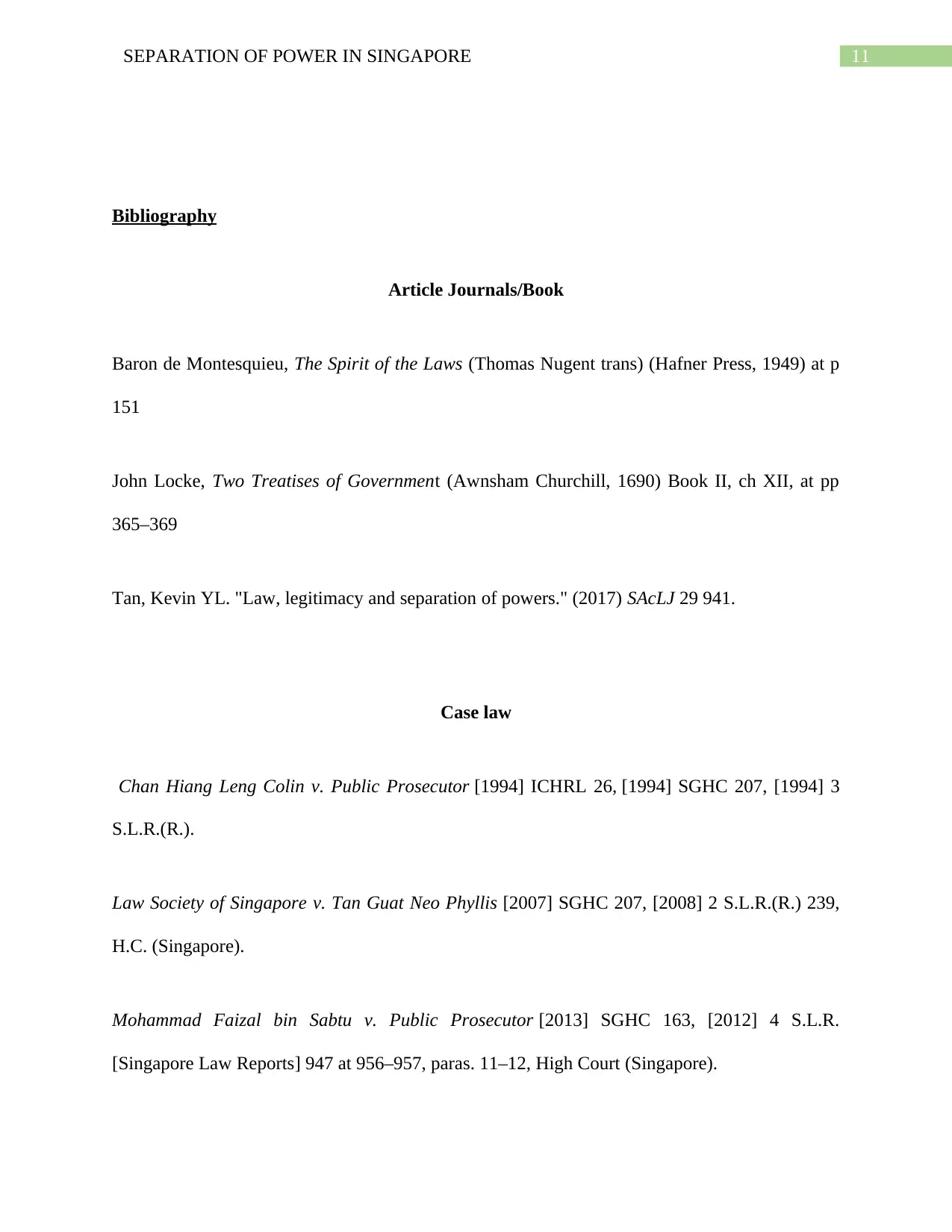
11SEPARATION OF POWER IN SINGAPORE
Bibliography
Article Journals/Book
Baron de Montesquieu, The Spirit of the Laws (Thomas Nugent trans) (Hafner Press, 1949) at p
151
John Locke, Two Treatises of Government (Awnsham Churchill, 1690) Book II, ch XII, at pp
365–369
Tan, Kevin YL. "Law, legitimacy and separation of powers." (2017) SAcLJ 29 941.
Case law
Chan Hiang Leng Colin v. Public Prosecutor [1994] ICHRL 26, [1994] SGHC 207, [1994] 3
S.L.R.(R.).
Law Society of Singapore v. Tan Guat Neo Phyllis [2007] SGHC 207, [2008] 2 S.L.R.(R.) 239,
H.C. (Singapore).
Mohammad Faizal bin Sabtu v. Public Prosecutor [2013] SGHC 163, [2012] 4 S.L.R.
[Singapore Law Reports] 947 at 956–957, paras. 11–12, High Court (Singapore).
Bibliography
Article Journals/Book
Baron de Montesquieu, The Spirit of the Laws (Thomas Nugent trans) (Hafner Press, 1949) at p
151
John Locke, Two Treatises of Government (Awnsham Churchill, 1690) Book II, ch XII, at pp
365–369
Tan, Kevin YL. "Law, legitimacy and separation of powers." (2017) SAcLJ 29 941.
Case law
Chan Hiang Leng Colin v. Public Prosecutor [1994] ICHRL 26, [1994] SGHC 207, [1994] 3
S.L.R.(R.).
Law Society of Singapore v. Tan Guat Neo Phyllis [2007] SGHC 207, [2008] 2 S.L.R.(R.) 239,
H.C. (Singapore).
Mohammad Faizal bin Sabtu v. Public Prosecutor [2013] SGHC 163, [2012] 4 S.L.R.
[Singapore Law Reports] 947 at 956–957, paras. 11–12, High Court (Singapore).
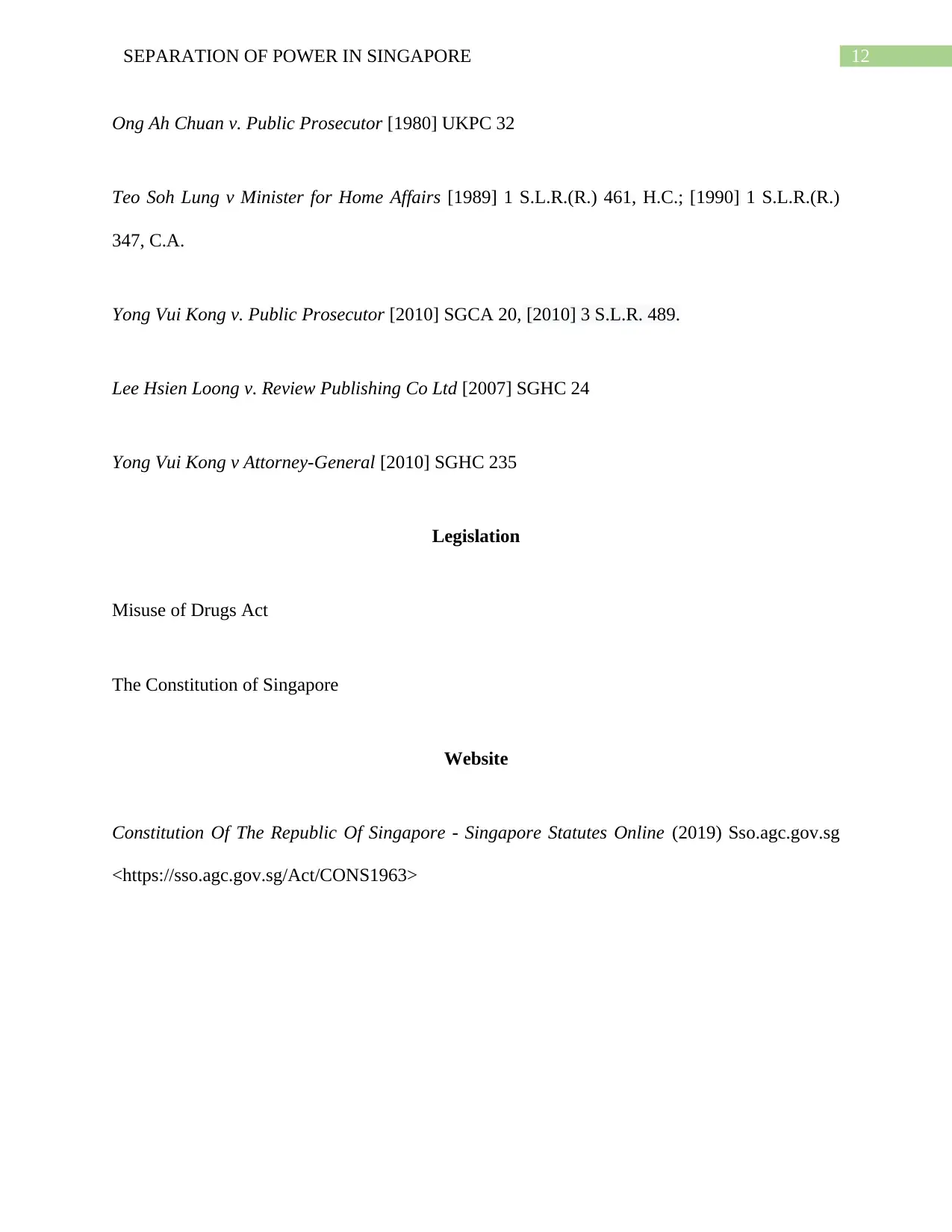
12SEPARATION OF POWER IN SINGAPORE
Ong Ah Chuan v. Public Prosecutor [1980] UKPC 32
Teo Soh Lung v Minister for Home Affairs [1989] 1 S.L.R.(R.) 461, H.C.; [1990] 1 S.L.R.(R.)
347, C.A.
Yong Vui Kong v. Public Prosecutor [2010] SGCA 20, [2010] 3 S.L.R. 489.
Lee Hsien Loong v. Review Publishing Co Ltd [2007] SGHC 24
Yong Vui Kong v Attorney-General [2010] SGHC 235
Legislation
Misuse of Drugs Act
The Constitution of Singapore
Website
Constitution Of The Republic Of Singapore - Singapore Statutes Online (2019) Sso.agc.gov.sg
<https://sso.agc.gov.sg/Act/CONS1963>
Ong Ah Chuan v. Public Prosecutor [1980] UKPC 32
Teo Soh Lung v Minister for Home Affairs [1989] 1 S.L.R.(R.) 461, H.C.; [1990] 1 S.L.R.(R.)
347, C.A.
Yong Vui Kong v. Public Prosecutor [2010] SGCA 20, [2010] 3 S.L.R. 489.
Lee Hsien Loong v. Review Publishing Co Ltd [2007] SGHC 24
Yong Vui Kong v Attorney-General [2010] SGHC 235
Legislation
Misuse of Drugs Act
The Constitution of Singapore
Website
Constitution Of The Republic Of Singapore - Singapore Statutes Online (2019) Sso.agc.gov.sg
<https://sso.agc.gov.sg/Act/CONS1963>
⊘ This is a preview!⊘
Do you want full access?
Subscribe today to unlock all pages.

Trusted by 1+ million students worldwide
1 out of 13
Related Documents
Your All-in-One AI-Powered Toolkit for Academic Success.
+13062052269
info@desklib.com
Available 24*7 on WhatsApp / Email
![[object Object]](/_next/static/media/star-bottom.7253800d.svg)
Unlock your academic potential
Copyright © 2020–2026 A2Z Services. All Rights Reserved. Developed and managed by ZUCOL.





